MASNEWS 1/2014: Highlights of the New Academic Year
Dear All,
 Welcome to the Heidelberg Center for American Studies’ MAS newsletter!
Welcome to the Heidelberg Center for American Studies’ MAS newsletter!
This edition surveys some of the highlights of the new academic year 2013/2014 at the HCA.
In October, the HCA welcomed the MAS class of 2015. Two students share their experiences with the buddy program, established by Heidelberg University to help international students getting settled in Heidelberg. One of the new MAS students as well as our visiting professor, Dr. Mark Wilson, tell us about their first weeks in Germany and at the HCA. A former MAS student shares how the MAS has influenced his future academic and professional career.
Furthermore, the MAS team reports on their experiences at education fairs in Chile. Additionally, we take a look back at the festivities during the fall semester.
Please feel free to forward our newsletter to anyone interested in American Studies. Of course, we appreciate any feedback you would like to share with us. If you would like to learn more about the HCA’s recent developments, please have a look at the Annual Report 2012/2013, which is now online.
Many thanks and best wishes for a prosperous and successful new year!
Prof. Dr. Dr. h.c. Detlef Junker
HCA Founding Director
Welcome to the MAS
The HCA welcomed 20 new students to its MAS program in the fall semester of 2013. To get settled in Heidelberg more easily, current HCA students assist newly arrived MAS students. The “buddy program” offered by nine departments of Heidelberg University has proven itself in practice over the years. Nadine Hillenbrand, a current student of the BAS program and her “buddy” Paul Bacharach from the new MAS class share their experiences with the buddy-program.
Paul:
After being accepted to the Heidelberg Center for American Studies Master’s program I was invited to join their buddy program. The program offered a German student from within the HCA to correspond with before leaving home in the U.S., as well as to meet with upon arrival in Germany. With a quite lengthy and ever growing to-do list of bureaucratic tasks on my hands I jumped at the opportunity to receive help.
Perhaps some of the most useful help I got from the buddy program came before I ever even left the states. The moment I received the first e-mail from my buddy Nadine, I started asking questions. Having a Heidelberg resident and fellow HCA student help me to decipher and understand the things I had been reading was incredibly beneficial. I had questions about the best way to get my student visa, the documents I would need, how to find housing, and a long list of questions on several other topics. My buddy did some research and was sure to deliver me accurate and helpful information to guide me in my transition.
Upon arrival in Heidelberg I did not waste any time and I met with my buddy first chance I got. During that first meeting my buddy directed me on how to accomplish a few of my trivial tasks like getting German health insurance, and we began my search for housing. During that meeting as well as the next few, my buddy helped me find and personally called several landlords on my behalf before the Studentenwerk had a vacancy open up. She proved she would do everything she could to help me in my search.
Nadine:
The buddy program of Heidelberg University is a good opportunity to get to know another language, another culture and furthermore the master´s students of the HCA. The reason I enjoy being part of this program is because I like to help students from all over the world to become familiar with studying in Heidelberg. Living in a foreign country can be stressful and confusing, as I have experienced on my own. Thus, I know how helpful it is to have a fellow student on one’s side. Furthermore, I like the idea of establishing bonds between the B.A. and M.A. students at our institution.
I have been a buddy to two international students and each experience was unique. One student needed help with organizational topics such as visa, living and studying in Heidelberg. My other buddy was more interested in the “German way of life” and we experienced a variety of social activities together. This voluntary program offers you a chance to meet new people. However, the atmosphere is very casual, we decide how often we meet. The meetings with my buddies are in English which helps me to improve my language skills. This is definitely an additional advantage. The best part of the buddy program is when you stop being buddies and start becoming friends.
First Days at the HCA
One of the 20 newly arrived MAS students is Jin Wu from Chengdu, China. She shares her very first impressions and experiences at the HCA.

I have always dreamed of attending a program with rigorous academics, helpful teachers and staff, a multi-national student body, easy access to resources and activities, and preferably in a place rich in natural and cultural features. Maybe I’m being a little too greedy. However, believe it or not, all my expectations were met here through the MAS program at the HCA! Even though I’ve only been in Heidelberg for one month, it’s become my second home and I have every confidence that it has much more to offer.
Things have settled down and gone smoothly since I arrived here. I had thought that it might take me three to four weeks to adapt to a totally new environment, but it turned out to be only three to four days. Apart from my strong adaptability (please allow me to say so), the preparation work made by the HCA staff was of great help. The well-designed reader and other booklets provided plenty information on life and study which saved me lots of time and energy during my new life transition. Also, the one-week orientation gave us a chance to interact with new classmates and professors and helped us to warm up and get prepared for the coming MAS life.
I have attended several classes so far and find them interesting and refreshingly challenging. Lectures are rich in content and through them I get a great exposure to the American Studies in every possible way. In tutorials, besides FAQ sessions on lecture contents, tutors usually conduct mini-lectures by adding more details and sharing their own perspectives on selected topics, which greatly supplement and enhance our understanding of the key points.
Life outside the classroom is amazing, too, and every MAS 2015er rocks! We initiate study groups. We organized a Canadian Thanksgiving party. We go on trips to nearby towns or neighboring countries on weekends. We hang out to taste different cuisines, or simply grab a beer at local bars in the evenings. And I understand that some of my classmates are forming a band and I look forward to hearing them perform at University Square on Christmas!
I take studying at HCA as an amazing privilege. Being in the midst of so much energy and intelligence, I feel thrilled to find that I’m gradually getting transformed.
Life After the MAS
Eduard Bruckner completed his MAS in 2007. Currently, he works for an American Company in Cluj-Napoca, Romania. Today, he tells us how his MAS experience fostered his scholarly development.
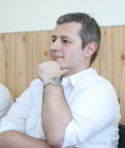
After a bit over 6 years since my graduation from the Master of Arts in American Studies program I cannot find a simple answer to the question what I gained from my degree at the Heidelberg Center for American Studies. As a student of the HCA, first of all I profited from the experience and patience of the MAS staff in order to learn about concepts that I may have had to master already since the undergraduate level, but unfortunately I was lacking in. Like the idea of the necessity of a 'scholarly method' in our papers, taught during the Methodology seminar in our first semester. As hard as it was for me for all its common sense, after one year I was finally able to answer the question: Alright, you wish to analyze a piece of literature, but what is your method? And I was able to appreciate its importance.
Secondly, I profited from the classes on American Literature which always surpassed the known routine of everyday courses of literary history. They revealed to us that literature can be experienced, understood and quantified not only as the product of a certain age or current but, most importantly, of a person, of an imagination. I learned that empathy is essential when reading and teaching literature, both with the author and the audience. Our literature courses helped me add to the method the aim of my endeavor, the answer to the question I had been struggling with during my undergraduate years: What is literature good for, in practice? The answer being: for people. Finally, the daring experiments that were our Business Culture course and especially the Literature-Business Seminar laid the foundation for some intellectual ventures, as well as some new questions, which would come in handy in due time.
It was one really short year, and I truly realized this when I had to say goodbye to the people with whom I managed to form a close fellowship of sorts, the ones that could not but remain a colorful part of my life, although since the graduation half a world away. For this one year was not all just fruitful labor, but immense fun as well – as stands proof one merry evening of innocent imbibing on the public transportation between Technologie Park and Bismarck Platz, the guilty parties besides myself remaining unnamed (they know who they are). This freedom is one advantage of life in Heidelberg, and Germany in general, which should weigh on prospective students' decision where to take up graduate studies.
But returning to more sober matters, after my year at the HCA a rather radical change occurred in my professional life. I applied for an entry-level position with an American company here in Cluj-Napoca and started learning a new craft. This was followed by a role in Inside Sales, which I am still pursuing at the moment. The reading of books and formulation of ideas may have reverted to a weekend past time. But the culture of business did grow remarkably from an introductory course into a day-to-day reality.
It is nevertheless the experience itself, the inside knowledge with the outside perspective that gave me the skills which were most useful in the world of outsourced services and matrix organizations. As a concrete, practical institution, the HCA, through its highly competent Master´s program, its mix of American and foreign ideas and individuals, its academic seriousness imbued with a business-like familiarity, managed to offer several perspectives and numerous insights which slowly nudged me in the right direction. It also opened some doors that helped me make some small sense of the world we are living in, while carving a place for myself in it.
Festive Days at the HCA
On Thursday, November 28, a well maintained and valued tradition took place in the Atrium of the Curt and Heidemarie Engelhorn Palais. Altogether 70 MAS students and HCA staff members celebrated the annual Thanksgiving dinner with traditional homemade dishes. After a short introduction on the history of celebrating Thanksgiving, Dr. Wilfried Mausbach, the HCA´s executive director, presented a unique and diverting recipe how to prepare a turkey. Not only the festively arranged Atrium, with nicely set tables, white tablecloths and red napkins, but also the fondly prepared dishes and desserts contributed to a familiar and relaxing atmosphere, making sure that this year’s Thanksgiving dinner—like previous ones—will become an abiding memory.
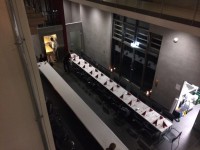
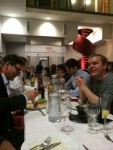
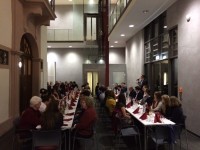
Welcome Mark Wilson
Mark R. Wilson, associate professor of history at the University of North Carolina at Charlotte, is a visiting professor at the HCA for the academic year 2013-14. Professor Wilson is giving a lecture on U.S. economic history and is teaching a graduate seminar on “The Great Depression and the New Deal” during the winter semester. Here, he shares a brief look into his academic background, his first days as a professor in Heidelberg and his plans at the HCA.

I’m delighted to have the opportunity to contribute to the HCA in 2013-14, as a visiting international professor. My home institution is the University of North Carolina at Charlotte, where I am an associate professor in the history department. My own research and writing has focused on the economics and politics of American war mobilizations and military-industrial relations, in the nineteenth and twentieth centuries. At the HCA, my main role is to enrich students’ understanding of U.S. economic history, broadly defined. Although we are still in the middle of the winter semester, it is already obvious to me that the year will be extraordinarily rewarding.
It might seem obvious that any American Studies program would want to offer some courses in economic history, but in fact, this is far from being the general rule. Since the 1960s, American economic history has been taught and practiced almost exclusively in economics departments, which emphasize formal mathematical modeling and sophisticated statistical techniques. Meanwhile, historians, having taken the so-called cultural turn, have tended to avoid even elementary quantitative analysis, in favor of a focus on language. Although there are some signs in recent years that this divide may be starting to close, it remains wide. Given these circumstances, it is notable that the HCA is working hard to include economic history in its program. This illustrates the HCA’s commitment to providing students with an education that is truly interdisciplinary.
During the winter semester, I am teaching the MA students in a lecture course on U.S. economic history. From my point of view, the results have been fruitful, thanks in part to the diversity of the student body and our location in Europe. To be sure, there may be some minor disadvantages that come from approaching the subject from Heidelberg, instead of Charlotte, or Chicago, or Houston. (It may be harder for a few students to gain access to primary sources for their term papers, for example.) However, for the most part, our international perspective makes for a course that is quite stimulating. For example, when we discussed the development of a monetary union in the U.S.A., we made useful comparisons to today’s euro zone. When we discussed the growing historical literature on smaller firms and flexible production during the industrial revolution, the students made our conversation richer by pointing us to evidence about the success of the more contemporary German Mittelstand. I look forward to our discussion of the Marshall Plan, the Bretton Woods system, and other aspects of the post-1945 global economic order. Here again, our location in Europe will provide the students with an advantageous perspective. So it turns out that studying U.S. economic history in Heidelberg is not only possible, but may be especially rewarding.
I am thankful for the warm welcome I have received from everyone at HCA, including all the talented faculty, staff, and students. Needless to say, I am enjoying the beautiful town of Heidelberg, where the local history, the river, the castle, and the hilly terrain offer a contrast to what I am used to in Charlotte. I have already enjoyed some of the regional cuisine, including hearty dishes featuring boar, goose, and venison. I am working on learning the basics of the German language, which, sadly, was not part of my past education. I find myself in an especially good position to learn more about the complexities of past and present European affairs, because I spend part of each week in Strasbourg, France, where my wife is a Fulbright scholar this year. So I actually get to spend the year living in two gorgeous and interesting cities (and trying to use two foreign languages), instead of just one.
Even though we are not yet midway through the academic year, I have already had an incredible experience at HCA. I look forward to whatever further adventures the coming months may bring!
Further News
Chile Report
Last May, the MAS team visited education fairs in Chile. A view behind the curtain offers insight into South American culture, newly developed markets and Chilean university structures.
After the promotion of the MAS program in China in October 2012, Professor Junker and the MAS team participated in education fairs in Chile. From May 4-9, the HCA delegation, consisting of Professor Junker, Eva Kiefer and Katia Rostetter, took part in the EuroPosgrados Feria International Becas Chile.
Amid the countries of South America, Chile is especially interesting as a cooperation partner due to its political stability and economic growth. Both universities and the government aim at an internationalization of the university system, especially in the area of postgraduate studies, which has led to the establishment of BECAS Chile, a scholarship system which supports students to study abroad. Although the U.S., the U.K. and Australia are still the favorite destinations of Chilean students who want to study abroad, the fact that the MAS program is in English is a big advantage vis-à-vis German programs. Knowledge of foreign languages, with the exception of English, is still not widespread in Chile.
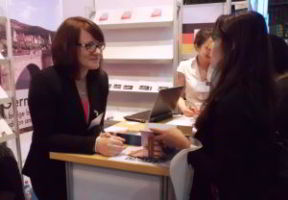
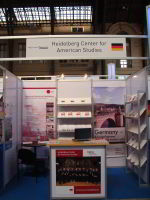
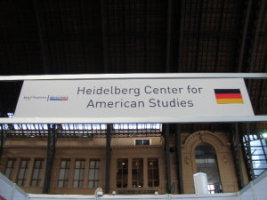
In addition to participating in the fair at Estación Mapocho in Santiago, the HCA delegation was also invited by Dr. Walter Eckel to present its MAS program at the Heidelberg Center para América Latina in Santiago. Thanks to contacts of MAS graduate and HCA PhD candidate Axel Kaiser, Prof. Junker furthermore presented the MAS program at the Instituto de Estudios Internacionales (Universidad de Chile) as well as at the Universidad Gabriela Mistral, and also established contacts with the Universidad de los Andes, in Santiago.
After a successful fair in Santiago, the next station was Antofagasta, where the fair was organized by the Universidad Católica del Norte. The last station of the EuroPosgrados which was very well frequented was held at the Universidad de Concepción, in Concepción. The participation in the EuroPosgrados fair was yet another great opportunity to explore a new market and make the MAS program more widely known around the world.
Book Launch at the HCA
Anthony Santoro, former MAS (Class of 2005) and PhD student at the HCA has just published his first book “Exile and Embrace: Contemporary Religious Discourse on the Death Penalty.” Recently, he introduced his book at the HCA. Both the talk and the book were enthusiastically received by a big public, student and faculty audience.
On October 22, 2013, I had the distinct privilege of taking the podium in the HCA to formally launch my book, Exile and Embrace: Contemporary Religious Discourse on the Death Penalty. The book, which followed from the doctoral dissertation that I successfully defended as part of the HCA’s structured Ph.D. program in 2010, was published by Northeastern University Press in July 2013.
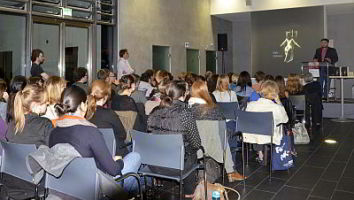
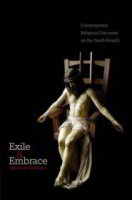
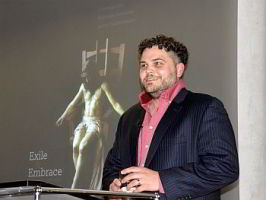
I was proud not only to launch the book but also to do so on my “home field” before a full house at the HCA, which has meant so much to me and has been my graduate and postgraduate home for nearly a decade. Following a gracious and humbling introduction from my doctoral supervisor, Manfred Berg, I introduced the book by way of telling the two stories of how I came to write the dissertation in the first place. I discussed my work with a non-profit organization in my home state of Virginia and how we assisted defense teams representing indigent capital defendants at the sentencing phase of capital murder trials. Working at that stage of the process I began to see more clearly than I had previously appreciated the extent to which religious belief plays a vital role in how individuals engage with capital punishment at various levels. When I started my doctoral work at the HCA, I began initially to look at the interaction between religion and the political process, which gradually led me back to the interaction between religion and the death penalty, and, via a somewhat circuitous and occasionally difficult route, to the book.
Rather than present a single chapter or discuss an aspect of the book’s argument in detail, I took advantage of the opportunity to survey the book’s seven chapters and discuss my aims and goals in writing on this difficult and controversial topic. I discussed what it means to use death to witness to life, as supporters and opponents of capital punishment both do, and how contemporary people of faith are engaged on both sides of this divisive issue at the state and national levels. At the conclusion of the talk, several members of the audience asked thoughtful and insightful questions, and I greatly enjoyed interacting with the audience in this way. I am grateful to everyone at the HCA not only for the opportunity to formally launch Exile and Embrace, but also for all of the support and opportunities that I have benefitted from over the last several years. Thank you.
Studying in Heidelberg
The HCA invites applications for the MAS class of 2016. Until March 31, 2014, interested students can apply by using our new online application forms.
Upcoming events
March 24-28, 2014
11th HCA Spring Academy Conference on American History, Culture & Politics
April 25, 2014
HCA Commencement 2014
For those who will not be able to attend the celebrations at the university’s Old Assembly Hall (Alte Aula), make sure to follow us on Facebook or check our website for a Livestream link.
July 4, 2014
HCA Decennial Festivities & Barbecue
Imprint
Heidelberg Center for American Studies (HCA)
Curt und Heidemarie Engelhorn Palais
Hauptstraße 120
69117 Heidelberg
Tel.: + 49 6221 543710
E-Mail: hca@uni-hd.de
www.hca.uni-hd.de
Distributed by postina.net, Heidelberg
This is a cost-free, non-profit service. No addresses or other information will be forwarded to third parties.


 Graduiertenkolleg
Graduiertenkolleg